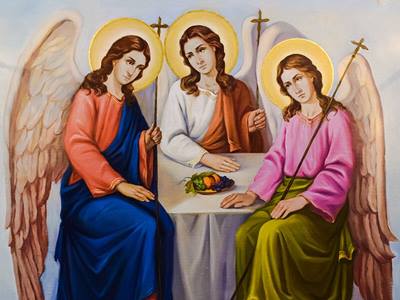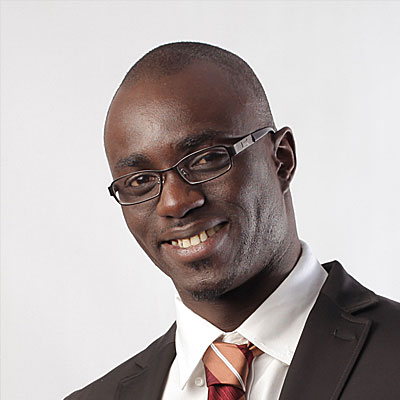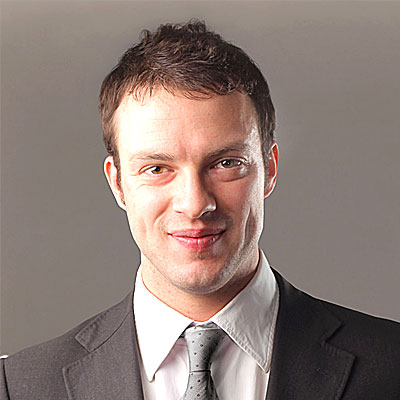Who Are The Archangels?
 October 7, 2019
October 7, 2019
- INTRODUCTIONvisible creatures of God. In other words, they are among the ‘things’ invisible which God has created. In proving the existence of angels, St. Thomas Aquinas holds that the very existence of angels is revealed by God in Scripture. Although human reason alone cannot prove the existence of angels, reason can explain the possibility of their existence. According to him, “God’s creation exists in successive stages of perfection, specifically three levels of existence: material, spiritual, and a combination of material and spiritual, as manifested in the human species. Angels exist…because the universe would be incomplete without pure spiritual beings. Angels exist as buffers between God and humans. Made in the image and likeness of God, angels are the most excellent of God’s creatures because they most closely resemble the nature of God.
This lecture is a modest attempt to widen our ken of knowledge about the activities of the Archangels Michael, Gabriel and Raphael. After this introduction, efforts shall be made to touch the following areas: definition of angel, angels in scripture, hierarchy of angels, who the archangels are, the three archangels, general functions/roles of angels, specific functions/roles of the archangels Michael, Gabriel and Raphael.
The conclusion enjoins all Christians to honour the angels, especially their guardian angels. From historical and patristic sources, this paper shall merely enumerate some saints who were privileged to physically encounter their guardian angels, because of the great respect given to the latter by the former.
- DEFINING AND DESCRIBING ‘ANGEL’
According to Charlene Altemose, “The word angel comes from the Greek aggelos, which stems from the Hebrew word mal’ak meaning ‘messenger”
Angels are spiritual beings; they have no material bodies. They are God’s messengers, whose mission is to take care of us humans, protect us from harm on our earthly pilgrimage, and to eventually present our souls to God when we die. Every human being has his own guardian angel. In the words of St. Jerome, “So sublime is the dignity of the soul that from its birth there is appointed to each one a Guardian Spirit”. St. Augustine of Hippo reports that the angels watch over us wherever we go. At God’s command, they come to our help and have compassion on us. The angels preserve our souls and bodies from all dangers; they defend us when we are tempted by evil spirits, and especially at the hour of our death. They inspire hold thoughts and deeds in God’s service. They warn us when danger is drawing near and carry our prayer to the throne of God.
- ANGELS IN SCRIPTURE
- Old Testament:
The history of angels in the Old Testament dates back to the year 1850B.C. At that time, we are told that Abraham, our Father in faith, welcomes three unknown visitors, and the latter promise him that he will be the father of a great nation. Although the exact identity of these visitors is not clear, it is certain that they carry a divine message (Gen. 18). Some years later, another angel rescues him from sacrificing his soon, Isaac (Gen. 22:11-12). Much later, that same angel travels with Abraham’s slave to find a wife for Isaac (Gen. 24:7).
Again, scripture tells us that two angels visit the towns of Sodom and Gomorrah. Abraham’s nephew, Lot, is hospitable to them, they warn him to leave Sodom and Gomorrah with his family before the cities are destroyed (Gen. 19:1-22).
The story of Jacob is replete with angels. In fact, his dream of seeing angels ascending and descending a ladder coming out of the sky has since formed a familiar topic for discussion by artists (Gen. 28:12). Later, an angel interprets his dream regarding his return to his own land (Gen. 31:11-13). Jacob’s popular angel encounter occurs as he wrestles with an angel at Peniel, where his name is changed to Israel” (Gen. 32:24-28, Hosea 12:4). While blessing his sons at the tail end of his life, Jacob prays that the angels protect them (Gen. 48:16).
Moses leads the Israelites out of Egypt with an angel to guide them (Ex. 23:20). The story of Balaam and his talking donkey is also very familiar. When Balaam is on his way to curse the Israelites, an angel blocks the road and appears only to Balaam’s donkey. It is only when the donkey speaks that Balaam also sees this heavenly barrier and obeys the angel’s instruction (Num. 22:22-35).
Some angels in the Old Testament are mentioned by name: Michael, Gabriel and Raphael are good examples. In Daniel, for instance, Michael is the chief prince of the heavenly host and guardian and protector of nations (Daniel 10:13, 12:1), who is believed to have led the attack which drives Satan out of heaven. Twice, the angel Gabriel appears to Daniel and interprets visions of the ram and goat and the seventy years of captivity (Daniel 8:16, 9:21). Raphael usually intervenes in human affairs (Tobit 5:4-12:21). He is the young man named Azariah who helps the God-fearing Tobit and his family. Here, angel Raphael performs the functions of being a journey companion, marriage arranger, exorcist, healer, and host of family reunion, etc. (Tobit 12:6-7).
Besides specific names, angels are also ranked according to the significance of their assignments. The two highest classes of angels, Seraphs (or Seraphim) and Cherubs (or Cherubim) are mentioned in a variety of Old Testament texts. With swords which burn like fire, Cherubim guard the gate of Eden after Adam and Eve have been driven away (Gen. 3:24). As winged creatures, the cherubs are commissioned by God to be placed by the Ark of the Covenant and in the Sanctuary of Solomon’s Temple (Ex. 25:10-22). Seraphs are high-ranking angels that reside within the heavenly vicinity, who render ceaseless praise to God. Prophet Isaiah is given an opportunity to have a foretaste of their glory as they sing “Holy, holy, holy (Is. 6:2-3); in fact, one of them purifies the prophet with a burning coal (Is. 6:6-7).
- New Testament:
The New Testament is replete with stories, mediations and manifestations of angels. Angels play nearly indispensable roles in the introductory chapters of the gospels of Matthew and Luke. The Infancy Narratives would not be complete without the actions of angels. Remove the angels from the Infancy Narratives, and the beauty of the Nativity would no longer be there (see Lk. 1:26, 27); the flight to Egypt (Matt. 1:20, 2:13, 20); Angel Gabriel announces the birth of John the Baptist to Elizabeth and Zechariah (Lk. 1:11-13).
During his public ministry, particularly in the desert, angels minister to Jesus. Angels comfort Jesus after his forty-day fast and temptation in the desert (Matt. 4:11; Mk. 1:13). Legions of Angels minister to Jesus (Mt. 26:53) and comfort him during his Agony in the Garden of Gethsemane (Lk. 22:43). Angels announce the Resurrection of the Lord (Mt. 28:2-7, etc.). Jesus foretells that he will be accompanied by angels at the Parousia, his Second Coming (Mt. 16:27). Angels will dispense justice on the day of judgment (Mt. 13:41, 24:31).
Peter and John are released from prison by an angel who encourages them to continue to proclaim the Good News (Acts 5:19-20). Peter, imprisoned by Herod, is liberated by an angel (Acts 12:7-11). St. Paul compares the supremacy of Jesus to the mission of the angels. He says, “To which of the angels did God ever say, ‘You are my Son…’” (Heb. 1:4-14).
- HIERARCHY OF ANGELS
In the Sixth Century A.D., an anonymous Syrian Monk, who referred to himself as Dionysius after a disciple of Paul, explained the heavens and the earth in a hierarchical fashion. Pseudo-Dionysius, as he is actually called, saw all of creation as being put together in successive stages from the lowest creature to the highest heaven. In The Celestial Hierarchy, he arranged the angels into nine choirs in a gradual ascent to God’s heavenly throne. His arrangement was later accepted by St. Thomas Aquinas, and still taught in Christian Angelology. Angelology is an attempt made by theologians to understand more about angels. This theological discipline employs analogies to help us understand the realm of angels.
Following this trend of thought, Aquinas and other theologians further subdivided the nine choirs of angels into three categories as enumerated below: The first group consists of the Seraphim, Cherubim and Thrones. The second group is made up of Dominations, Virtues and Powers, while the third group comprises the Principalities, Archangels and Angels. Their functions are also categorized thus:
Seraphim, Cherubim, and Thrones, the highest order of angels, are closest to God and worship God around the heavenly throne. The second triad governs the universe. These angels are said to preserve order and carry out God’s will in the cosmos. Principalities, Archangels, and Angels, the lowest order, deal directly with earth by communicating God’s plan and by protecting and guarding human beings.
- WHO ARE THE ARCHANGELS?
An archangel is an angel of high rank. The word “archangel” itself is usually associated with the Abrahamic religions, but beings that are similar to archangels are found in a number of religious traditions (Wikipedia). Archangels are extraordinary beings, extensions of God himself, personifying his grace and majesty and power.
Archangels are only mentioned twice in the Bible and only one angel is specifically called an Archangel, Michael.
Archangels, God’s top angels, are such powerful spiritual beings that they often capture people’s attention and awe. While the exact amount of archangels is debated among different faiths, seven archangels supervise angels who specialize in different types of work helping humanity, and four of these are considered by many believers to be the most important archangels. They are: Michael, Gabriel, Raphael, and Uriel. Michael, who leads all of the holy angels, often works on missions that involve fighting evil, proclaiming God’s truth, and strengthening people’s faith. Gabriel, who communicates God’s most important announcements to humans, specializes in helping people to understand God’s messages and apply them well to their lives. Raphael, who serves as God’s main healing angel, cares for the health of people, animals and every other part of God’s creation. Uriel, who focuses on wisdom, often works on missions of helping people learn more about God, themselves, and others.
Although most saints are human souls who live as people on earth before going to heaven, three of these leading archangels are considered saints, as well. They respond to prayers for help about certain types of concerns that relate to their areas of specialization.
Saint Michael is the patron saint of sick people and those who work in dangerous conditions, like police officers and other security agents. He helps people fight through challenges and emerge victorious. Saint Gabriel is the patron saint of communication. He helps people send, receive, and understand messages well. Saint Raphael is the patron saint of healing for body, mind and spirit. He helps people experience the best health they can physically, mentally, emotionally, and spiritually.
- THE THREE ARCHANGELS
The Sacred Scriptures have revealed the proper names of only three angels, all of whom belong to the Choir of the Archangels. The names are well known to all: Michael, Gabriel, Raphael. Ancient Apocryphal literature of the Old Testament contains several other names of Archangels in addition to the three just mentioned. Like the sources themselves, these other names appear to be genuine, but are doubtful. Names like Uriel, Raguel, Sariel, and Jeremiel are not found in the canonical books of Sacred Scripture, but in the apocryphal book of Enoch, fourth book of Esdras7 and in rabbinical literature. The Church does not permit proper names of Angels that are not found in the canonical books of the Bible. All such names that were taken from apocryphal writings were rejected under Pope Zachary, in 745. There must have been danger of serious abuses in this regard during that century, because a similar step was taken in a synod held at Aix-la-Chapelle in 789.
The Archangel Michael:
Michael is derived from the Hebrew Mikha’el meaning “who is as God?” His name signifies a battle cry, and an eternal trophy of victory. As the proper name of one of the great Archangels, the word Michael appears for the first time in the book of the Prophet Daniel, where he is called: “Michael, one of the chief princes,”and again: “At that time shall Michael rise up, the great prince, who stands for the children of thy people.
The name “Archangel” is given only to Saint Michael, even though sacred tradition and the liturgy of the Church attribute the same title to Saint Gabriel and Saint Raphael: “When Michael, the archangel, disputing with the devil, contended about the body of Moses, he durst not bring against him the judgment of railing speech, but said: The Lord command thee.”10 (Read the letter of St. Jude 1:1-16 to understand this message fully). In spite of such an explicit testimony of the Scripture, a few writers have maintained that Saint Michael, because of his exalted position among the Angels, must belong to a much higher order, perhaps that of the Seraphim, rather than to the order of Archangels. We do not believe that this opinion can be defended. The exalted position occupied by Saint Michael can be explained by the fact that, even though he belongs to a relatively low order by nature, his outstanding zeal for the glory of God and the salvation of his fellow Angels, at the time of Satan’s rebellion, merited him such glory and power as to equal and even to excel through grace such celestial spirits that belong to a much higher Choir by nature. If we remember, angels lived through a period of probation during which they could merit each according to his works. The great variety of merit explains, in addition to other natural elements, the great difference in their glory and in their power.
Father Joseph Husslein points out that the church calls Saint Michael “Prince of the heavenly hosts”—Princeps militia, saying, “the fact that the three angels…are spoken of as Archangels need not imply more than that they were entrusted with extraordinary missions. Michael is the only one to whom the Scriptures apply this title, but there is good reason for the opinion that he may be the very highest of all the angels. St. Michael is indeed the prince of the heavenly hosts, but this is sufficiently explained by the power granted him by God and not necessarily by superiority of nature. We believe that a power of that sort would not be conferred upon Seraphim and Cherubim who are the living throne of God, but rather upon those who belong to the order of ministering spirits, namely Principalities, Archangels, and Angels, who “are sent to minister for them, who shall receive the inheritance of salvation.
The Archangel Gabriel
The name Gabriel seems to be composed of the Hebrew words gebher, man, and el, God. It means, therefore, “man of God”, or “Strength of God”.
Practically all the missions and manifestations of this Archangel are closely connected with the coming of the Messiah. The most accurate prophecy regarding the coming of Christ was made by Saint Gabriel through the prophet Daniel (Dan. 8:26).
Immedeiately before the coming of Christ we meet the Archangel Gabriel in the temple of Jerusalem, announcing to Zacharia the birth of a son, John the Baptist, the precursor of Christ: “I am Gabriel, who stand before God, and am sent to speak to thee, and to bring thee these good tidings” (Luke 1:19f).
The greatest and by far the most joyful message ever committed to an Angel from the beginning of time, was the one brought by the Archangel Gabriel to the Virgin Mary, announcing to her the incarnation of the Word of God and the birth of Christ, the Saviour of mankind. It is the first time that a prince of the court of heaven greets an earthly child of God, a young woman, with a deference and respect a prince would show to his Queen.
It seems highly probable that Gabriel, the Archangel of the Annunciation, was given special charge of the Holy Family of Nazareth. He was probably the Angel who brought “good tidings of great joy” to the shepherds “keeping night watches over their flock,” the night that Christ was born of the Virgin Mary in Bethlehem. We notice, on this occasion, the same procedure of first dousing fear and surprise, as had been the case at Mary’s Annunciation by Gabriel: “Fear not, for, behold, I bring you good tidings of great joy….This day is born to you a Saviour, who is Christ the Lord, in the city of David.” Who else could be the messenger of such good tidings, but he who had promised them through the prophet Daniel, and announced them to Mary, Gabriel the Archangel?
The Archangel Raphael
Etymologically, “Raphael” was derived from two Hebrew words rapha: to heal, and el “God. It means “God heals” or “the divine healer”. The history of Tobias, father and son, contains the greatest angelophany of the whole Bible, and it all revolves around the manifestation of the Archangel Raphael, under the assumed name and form of a beautiful young man named Azarias. At the very end of his long mission, the archangel revealed his own identity and his real name together with the actual purpose of his mission. “And now the Lord had sent me to heal thee, and to deliver Sera, thy son’s wife from the devil. For I am the angel Raphael, one of the seven who stand before the Lord” (Tobit 12:14f). In this Angelophany, St. Raphael reveals himself as a divine healer, not only of physical infirmities, the blindness of old Tobias, but also of spiritual afflictions and diabolical vexation as in the case of Sera, young Tobias’ wife. Had not the archangel resorted to an assumed human form and personality, it might not have been possible for him to consort in such a familiar way with men, for several consecutive weeks, because of the instinctive fear that man experiences in the presence of celestial beings.
- GENERAL FUNCTIONS/ROLES OF ANGELS
- Angels are agents and messengers of God’s divine plan.
- Thomas Aquinas holds that “…the mission and role of angels is to worship and adore God, to communicate God’s plan to humans, and to act as guardians and protectors. That angels protect us and have a sincere interest in our human welfare are beliefs that go back to biblical times….God designated angels to be in charge of every material part of creation.
- Alphonsus Mary Liguori says that “Our prayers are so dear to God that he has appointed the angels to present them to him as soon as they come forth from our mouths.
- “Our angel, who has been our constant companion during life, is most closely present to us at the hour of our death. We believe that our angel eases our passing by being most attentive to our welfare as we are about to leave this life. Numerous accounts of persons who have had near-death experiences attest to the calm and serenity they sensed in the presence of a peaceful light.
- “We believe that angels and saints are powerful intercessors for us in our human needs before God. Some saints are known to be more effective in certain causes, and have been named as “patron saints”. Among those listed as “patron saints” are the three angels we honour in the Catholic Church (Michael, Gabriel and Raphael).
- SPECIFIC FUNCTIONS/ROLES OF THE ARCHANGELS MICHAEL, GABRIEL AND RAPHAEL
The Feast of the above named Archangels is celebrated every September 29. Holy Mother Church honours these three Archangels because of the very significant roles they play in human life, particularly in the Christian Religion.
Michael:
It is a Hebrew name which means “Who is like God?” This name originated from the fact that he defeated Satan and his bad angels and drove them from heaven to earth. Michael was his battle cry when he took on the power of darkness. When Satan and his followers fought against God, Michael led the good angels and triumphed over evil. By so doing Michael would continue to defend all those who are God’s friends. The Revelation of St. John reports that:
…war broke out in heaven. Michael and his angels fought against the dragon, who fought back with his angels, but the dragon was defeated, and he and his angels were not allowed to stay in heaven any longer. The huge dragon was thrown out—that ancient serpent, called the Devil or Satan that deceived the whole world. He was thrown down to earth, and all his angels with him (Rev. 12:7-9).
Till date, Christians have always implored the Archangel Michael to be their protector. Indeed, Michael is the protector of the whole human race and reminds us that the devil exists. Catholic tradition assigns four main functions to him, namely, (1) To fight against Satan; (2) To rescue the souls of the faithful from the grasp of Satan, especially at death; (3) To bring men’s souls to judgment. (4) St. Michael is the Guardian of all mountainous places. He is the special Guardian Angel of the Pope and of the Blessed Sacrament.
Gabriel:
The name “Gabriel” means “strength of God” or “God is my strength”. He is a messenger of good news. He was the one who told the Blessed Virgin Mary that she would bear the Messiah, the Saviour of the world. He also announced to Zechariah the coming birth of St. John the Baptist. He is, therefore, referred to as the Angel of the Annunciation.
Christian tradition also attributes to Gabriel the message given to the shepherds at Bethlehem that Jesus, the Saviour has been born, and to St. Joseph concerning the flight to Egypt. Prophet Muhammed (Peace be upon him) considered St. Gabriel the head of all the angels and claimed to have received his revelations from him.
Raphael:
This name is interpreted as “the medicine of God” or “the healing of God” or “God heals” or “God has healed”. The name actually originated from the fact that he cured the blindness of Tobit (see Tobit 11:7-13).
He guided Tobias, Tobit’s son, through some adventurous journeys, which ended with Tobias’ marriage to Sarah. Specifically, he guided Tobias during his trip to Meria (Tobit 5:4-22). Consequently, he is the Patron Saint of all travellers and pilgrims. He is also the Patron Saint of the young and innocent. St. Bernard says, “Make the holy angels your friends! No matter how weak you may be, how sad your condition or how great the perils which surround you, have nothing to fear under the protection of such guardians!
- CONCLUSION
This paper has been at pains to explain to us who the archangels are. Generally, this lecture has put across the fact that all angels are non-corporeal beings. They are pure spirits, and have no material bodies like human beings have. St. Thomas Aquinas, a great theologian of the Catholic Faith, maintains that “…angels are pure spirits, not partitioned by matter, each angel is its own distinct species and has no body, although it may assume human form when appearing to humans…
Secondly, we have gathered that all good angels have been created by God to minister to accompany human beings on their pilgrim way from earth to heaven. Except in the hierarchy of angels, where we have come to know that the highest ranking angels (namely the Seraphim, Cherubim and Throne) surround God’s throne and sing ceaseless praise to God, other ministering Archangels and angels performs their functions to the advantage of human beings. The three archangels which Feast Day we are preparing to celebrate (Michael, Gabriel and Raphael) are called Archangels, in other words, “Chief-Angels” to underscore the great importance of the assignments which God has entrusted to each of them. Indeed:
“Catholic doctrine teaches that the angels are involved in our affairs and that, at times, God graces certain individuals with ‘proof’ of their presence. The lives of the saints are filled with examples of those who have tangible experiences of angels. Francis of Assisi…was gifted with the stigmata, the wounds of Christ, by Seraphim. Frances of Rome, a widow and mystic, and Gemma Galgani, a household servant, felt and saw the presence of their angels in their daily lives. Joan of Arc summoned by Archangel Michael, led the French army to victory over the English….Today’s angel encounters continue to inspire us to awe.
The bullet points of this lecture are: HONOUR THE ANGELS! BE GRATEFUL FOR THEIR COMPANIONSHIP! BEFRIEND YOUR GUARDIAN ANGELS!
May the Archangels Michael, Gabriel and Raphael continue to lead us through our earthly life unto eternity. May we continue to appreciate their significant roles in our lives through Christ our Lord. Amen.
BY REV. FR. MARK AJIGA
 Guy Wilkins
Guy Wilkins Larry Reed
Larry Reed Roxanne Holland
Roxanne Holland Bridget Kennedy
Bridget Kennedy Sally Mendoza
Sally Mendoza